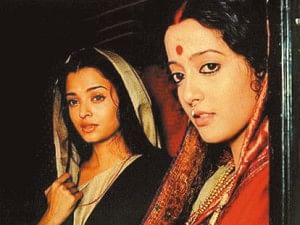Filmdom hits upon a 'novel' idea!
Cultural Correspondent
In a scenario where there is a dearth of good stories, the ever-enterprising filmdom hit last year upon a 'novel' idea of attracting viewers.The stories of at least four to five films were based on novels. These include Chashi Nazrul Islam's for|hcoming Shasti, based on Sarat Chandra Chattapadhyay's novel, Humayun Ahmed's Shyamal Chhaya and Morshedul Islam's Duratta, based on a story of Humayun Ahmed. Actor-turned director Touquir Ahmed won an award at the 2nd International Film Festival for his debut film Joyjatra, based on a novel of Amjad Hossain. Both Humayun and Touquir's films project perilous boat journeys of groups of refugees during the Liberation War. Another milestone in the year was the most hyped Bangla film Chokher Bali, a celebrated literary work of Rabindranath Tagore. Starring Aishwarya Rai, acclaimed filmmaker Rituparno Ghosh from West Bengal, India, brought the story on celluloid. Shot at Ramnagar, near the holy town of Varanasi in Uttar Pradesh and Kolkata, Chokher Bali deals with the social ills of the then Bangla society, besides widow remarriage and inhuman practice of satidaho ritual. The former Miss World plays the character of Binodini, a widow who refused to lead a life of deprivation. Novels provide a readymade platform on the screen for filmmakers who use 'cinematic liberty' to suit the audience. The box office earnings of such ventures has not been very encouraging in the past, with the majority of such films failing to achieve commercial success. However, film analysts generally appreciate the trend of filmmakers drawing inspiration from literary works, even though there could be distortions in the screen version.
|

Aishwarya Rai and Raima Sen in Chokher Bali |